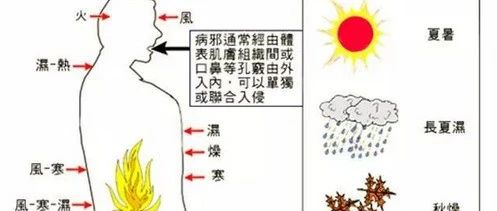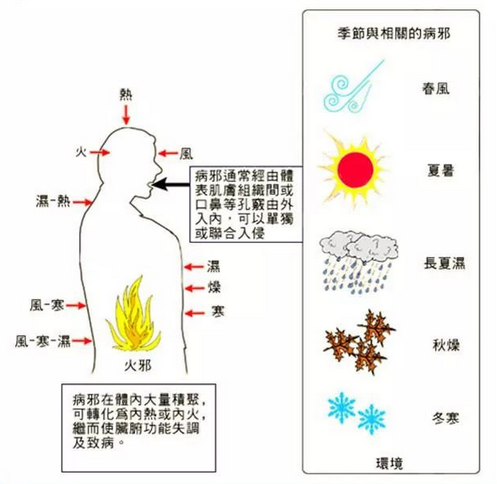Necklace Tribe
Introduction: In Traditional Chinese Medicine (TCM), the Six Excesses refer to the six pathogenic factors: Wind, Cold, Heat, Dampness, Dryness, and Fire, which are the primary causes of external diseases. The “Su Wen: The Great Discussion on True Essentials” states: “All diseases arise from Wind, Cold, Heat, Dampness, Dryness, and Fire.” Wei Yuan from the Qing Dynasty noted in “Mo Gu Shang: Learning Chapter Fourteen”: “A person’s life lasts only a few decades, while the elements of water and fire in nature affect the body for decades, nourished by food and emotions, leading to vitality and decline.”
(1) Wind causes skin rashes and itching in the muscles. Wind rashes create a sensation of itchiness on the skin, treated with the Si Wu Xiao Feng San (Four Substance Wind Dispelling Powder) – Sheng Di (Rehmannia), Dang Gui (Angelica Sinensis), Chi Shao (Red Peony), Chuan Xiong (Ligusticum), Jing Jie (Schizonepeta), Fang Feng (Saposhnikovia), Bai Xian Pi (Dictamnus), Chan Yi (Cicada Slough), Bo He (Mint), Du Huo (Angelica Pubescens), Chai Hu (Bupleurum), Hong Zao (Red Dates), removing Du Huo and adding Sang Ye (Mulberry Leaf). Avoid using cold, cool, or spicy hot herbs.
In the tendons, Wind causes spasms (when Wind prevails, it causes movement; when Wind is in the tendons, it causes convulsions, which is its pathology). There are distinctions between Wind-Cold and Wind-Heat; Wind-Cold leads to spasms with rigidity, while Wind-Heat leads to spasms with movement. Both can be treated with Tian Ma Gou Teng Yin (Gastrodia and Uncaria Decoction) – Tian Ma (Gastrodia), Gou Teng (Uncaria), Zhi Zi (Gardenia), Huang Qin (Scutellaria), Shi Jue Ming (Haliotis), Du Zhong (Eucommia), Niuxi (Achyranthes), Sang Ji Sheng (Mulberry Mistletoe), Xia Ku Cao (Prunella), Ye Jiao Teng (Polygonum), Fu Shen (Poria), removing Zhi Zi, Huang Qin, Niuxi and adding Gui Zhi (Cinnamon Twig), Qiang Huo (Notopterygium), and for Wind-Heat, removing Du Zhong, Niuxi and adding Ling Yang Jiao (Antelope Horn) and Sang Zhi (Mulberry Branch).In the bones, Wind causes cracking sounds; when Wind is in the joints, it can cause them to crack during movement. Medical texts mention that Bai Fu Zi (Typhonium) can be therapeutic, but this requires further exploration.(2) Cold on the skin causes shivering. Shivering is a cold sensation, often seen with chills. For mild cases, use Su Ye (Perilla) and Fang Feng (Saposhnikovia); for severe cases, use Ma Huang (Ephedra) and Qiang Huo (Notopterygium), which have a significant effect. If not resolved, consider other factors.Cold in the muscles causes stiffness. When Cold is in the muscles, it leads to local muscle stiffness, commonly treated with Ma Huang (Ephedra), Fu Zi (Aconite), and Xi Xin (Asarum) to dispel Cold evil and warm the Qi and blood. If it persists, use Da Huo Luo Dan (Great Activating Decoction). However, if there is persistent numbness with phlegm or stagnant blood, differentiation is necessary.Cold in the tendons causes soreness. Soreness in the muscles can be treated with Gui Zhi (Cinnamon Twig), Qiang Huo (Notopterygium), Fang Feng (Saposhnikovia), Qin Jiao (Gentiana), Bai Zhi (Angelica Dahurica), and Lu Shi Teng (Clematis) which are generally effective, and can be combined with massage therapy for better results.Cold in the bones causes pain. Pain due to Cold evil is often treated with Xiao Huo Luo Wan (Minor Activating Pill) to relieve pain and dispel Cold, which is very effective. If ineffective, it can be adjusted with Shi Guo Gong Jiu (Historical Duke’s Wine).(3) Heat on the skin causes burning without sweating. Use Ji Su San (Chicken Perilla Powder) with Qing Hao (Artemisia Annua), Xiang Ru (Elsholtzia), Lian Qiao (Forsythia), Zhu Ye (Bamboo Leaf), and He Ye (Lotus Leaf).Heat in the muscles causes restlessness with sweating. Use Bai Hu Tang (White Tiger Decoction) with Bei Sha Shen (North American Ginseng), Lu Gen (Reed Rhizome), Xigua Zhi (Watermelon Rind), and Lv Dou Yi (Mung Bean Pod).Heat in the tendons causes weakness. Heat is often accompanied by Dampness; this condition is a gradual weakness, treated with Wu Shi Qing Luo Yin (Wu Shi’s Clear Meridian Decoction) – Jin Yin Hua (Honeysuckle), Bian Dou Hua (Lima Bean Flower), Si Gua Luo (Luffa), Zhu Ye (Bamboo Leaf), He Ye (Lotus Leaf), and Xigua Cui Yi (Watermelon Peel) with Gou Teng (Uncaria) and Sang Zhi (Mulberry Branch).Heat in the bones causes weakness and fatigue. This condition progresses from mild to severe, treated first with Cang Zhu Bai Hu (Atractylodes White Tiger) plus Huang Bai (Phellodendron), followed by Hu Qian Wan (Tiger’s Hidden Pill) as a decoction, adding Chen Pi (Aged Tangerine Peel) for dispersing.(4) Dampness on the skin causes jaundice. For Yang jaundice, use Yin Chen Hao Tang (Artemisia Yin Chen Decoction); for Yin jaundice, use Yin Chen Shu Fu Tang (Artemisia Yin Chen and Atractylodes Decoction) or Yin Chen Wu Ling San (Artemisia Yin Chen and Five Poria Powder). Clinical experience shows that for jaundice to recede, Gui Shao Liu Jun Zi Tang (Return to Health Six Gentlemen Decoction) or Bu Zhong Yi Qi Tang (Tonify the Middle and Augment Qi Decoction) is needed for regulation.Dampness in the muscles causes swelling. For upper body swelling, induce sweating to dispel Dampness, primarily using Ma Huang Lian Qiao Chi Xiao Dou Tang (Ephedra, Forsythia, and Red Bean Decoction); for lower body swelling, promote urination to dispel Dampness, primarily using Wei Ling Tang (Stomach and Poria Decoction).Dampness in the tendons causes weakness. The causes of weakness due to Dampness differ from those due to Heat; the treatment methods vary. This condition belongs to Dampness stagnating in the tendons, commonly treated with Du Huo Ji Sheng Tang (Angelica Pubescens and Mulberry Mistletoe Decoction) – Du Huo (Angelica Pubescens), Sang Ji Sheng (Mulberry Mistletoe), Fang Feng (Saposhnikovia), Qin Jiao (Gentiana), Xi Xin (Asarum), Chuan Xiong (Ligusticum), Gan Cao (Licorice), Rou Gui (Cinnamon), Dang Gui (Angelica Sinensis), Shu Di (Rehmannia), Bai Shao (White Peony), Fu Ling (Poria), Du Zhong (Eucommia), Niuxi (Achyranthes), Dang Shen (Codonopsis), removing Rou Gui and Shu Di, and appropriately adding Er Miao Wan (Two Marvels Pill).Dampness in the bones causes heaviness. This is primarily characterized by sluggish movement, not light and agile, indicating internal Dampness. Generally, Ping Wei San (Calm the Stomach Powder) and Shu Fu Tang (Atractylodes and Fu Ling Decoction) are used; for those who do not recover over time, add Chuan Xu Duan (Chinese Teasel) and Gou Ji (Cibotium).(5) Dryness on the skin causes dryness, and in the muscles, it causes stiffness. Autumn dryness generally injures lung fluids, then stomach fluids, and finally affects liver blood and kidney yin. Lung fluid injury leads to dry skin, while stomach fluid depletion leads to muscle atrophy. The former is treated with Sheng Xue Run Fu Yin (Blood Generating and Skin Moistening Decoction) – Sheng Shu Di (Raw Rehmannia), Tian Dong (Asparagus), Dang Gui (Angelica Sinensis), Huang Qi (Astragalus), Tao Ren (Peach Kernel), Hong Hua (Safflower), Huang Qin (Scutellaria), Gua Lou (Trichosanthes), and Wu Wei Zi (Schisandra) removing Huang Qin and Wu Wei Zi and adding Bai Zi Ren (Platycladus) and Ma Zi Ren (Hemp Seed); the latter, in addition to the above herbs, should drink a cup of milk with a tablespoon of honey every morning.Dryness in the tendons causes rigidity. Dampness is soft and flexible, while dryness is rigid, leading to prolonged changes. Treat with Zi Zao Yang Rong Tang (Nourishing and Moistening Decoction) – Sheng Shu Di (Raw Rehmannia), Dang Gui (Angelica Sinensis), Bai Shao (White Peony), Huang Qin (Scutellaria), Gan Cao (Licorice), Qin Jiao (Gentiana) plus Sang Zhi (Mulberry Branch) and Gua Lou Gen (Trichosanthes Root), to clear and moisten, softening rigidity, which is quite effective. If it develops into tendon spasms, use Ejiao Ji Zi Huang Tang (Donkey-hide Gel and Egg Yolk Decoction) as the main formula, adding Gou Qi Zi (Goji Berries), Rou Cong Rong (Cistanche), Shu Di (Rehmannia), and Lu Jiao Jiao (Deer Antler Glue).Dryness in the bones causes soreness. Soreness and pain should be treated with blood nourishing and essence benefiting methods. For nourishing blood, use Sheng Di (Raw Rehmannia), Dang Gui (Angelica Sinensis), Bai Shao (White Peony), Ji Xue Teng (Spatholobus), and for benefiting essence, use Shu Di (Rehmannia), Gou Qi Zi (Goji Berries), Gui Ban (Tortoise Shell), Yu Piao (Fish Bladder), and Yang Guo (Bone Marrow).(6) Fire on the skin causes burning. Burning is a dry heat sensation, often accompanied by a feeling of scorched hair. Treat with Qing Xin Tang (Clear Heart Decoction) – Lian Qiao (Forsythia), Zhi Zi (Gardenia), Sheng Gan Cao (Raw Licorice), Bo He (Mint), Huang Qin (Scutellaria), Huang Lian (Coptis), Zhu Ye (Bamboo Leaf), Da Huang (Rhubarb), and Mang Xiao (Mirabilite), removing Mang Xiao and Da Huang and adding Sheng Di (Raw Rehmannia) and Shi Gao (Gypsum).Fire in the muscles causes pain. This pain should be observed from both local and systemic tendon areas. If local pain is considered Heat Bi, treat with Sheng Di (Raw Rehmannia), Shi Gao (Gypsum), Zhi Mu (Anemarrhena), Huang Qin (Scutellaria), Chi Shao (Red Peony), Hu Zhang Gen (Reynoutria), Xihe Liu (Salix), and Da Qing Ye (Isatis).Fire in the tendons causes pain. Pain is a soreness sensation, treated with methods for Heat Bi, preventing the condition from transitioning from excess to deficiency over time, using Qing Yang Tong Luo (Clear Yang and Open Collaterals) – Sheng Di (Raw Rehmannia), Bai Shao (White Peony), Yu Zhu (Polygonatum), Tian Dong (Asparagus), Mai Dong (Ophiopogon), Sang Ji Sheng (Mulberry Mistletoe), Shen Jin Cao (Stretching Grass), Gou Teng (Uncaria), and Zhu Li (Bamboo Juice).Fire in the bones causes steaming. Fire in the bones often indicates deficiency fire or hidden heat, with heat emerging from within, termed steaming, which is a critical symptom. Treat with Wu Zheng Wan (Five Steaming Pill) – Qing Hao (Artemisia Annua), Di Gu Pi (Lycium), Sheng Di (Raw Rehmannia), Dang Gui (Angelica Sinensis), Shi Gao (Gypsum), Hu Lian (Corydalis), Bie Jia (Soft-shelled Turtle Shell) or Da Bu Yin Wan (Great Tonifying Yin Pill) – Zhi Mu (Anemarrhena), Huang Bai (Phellodendron), Shu Di (Rehmannia), Gui Ban (Tortoise Shell), and Yang Guo (Bone Marrow) as a decoction. This condition has already transitioned from the Six Excesses to internal injury, so medication should be gradually effective.
This content is for clinical reference only; non-professionals should not attempt acupuncture or medication.For more exciting content, please follow me.▼ Necklace Tribe
Necklace Tribe  nsblzh11Copyright Statement: Edited by/Gu Lan Proofread by/Yu Duo Text and images/originate from the internet Copyright belongs to the original authorIf you find it useful, please give alike!
nsblzh11Copyright Statement: Edited by/Gu Lan Proofread by/Yu Duo Text and images/originate from the internet Copyright belongs to the original authorIf you find it useful, please give alike!


